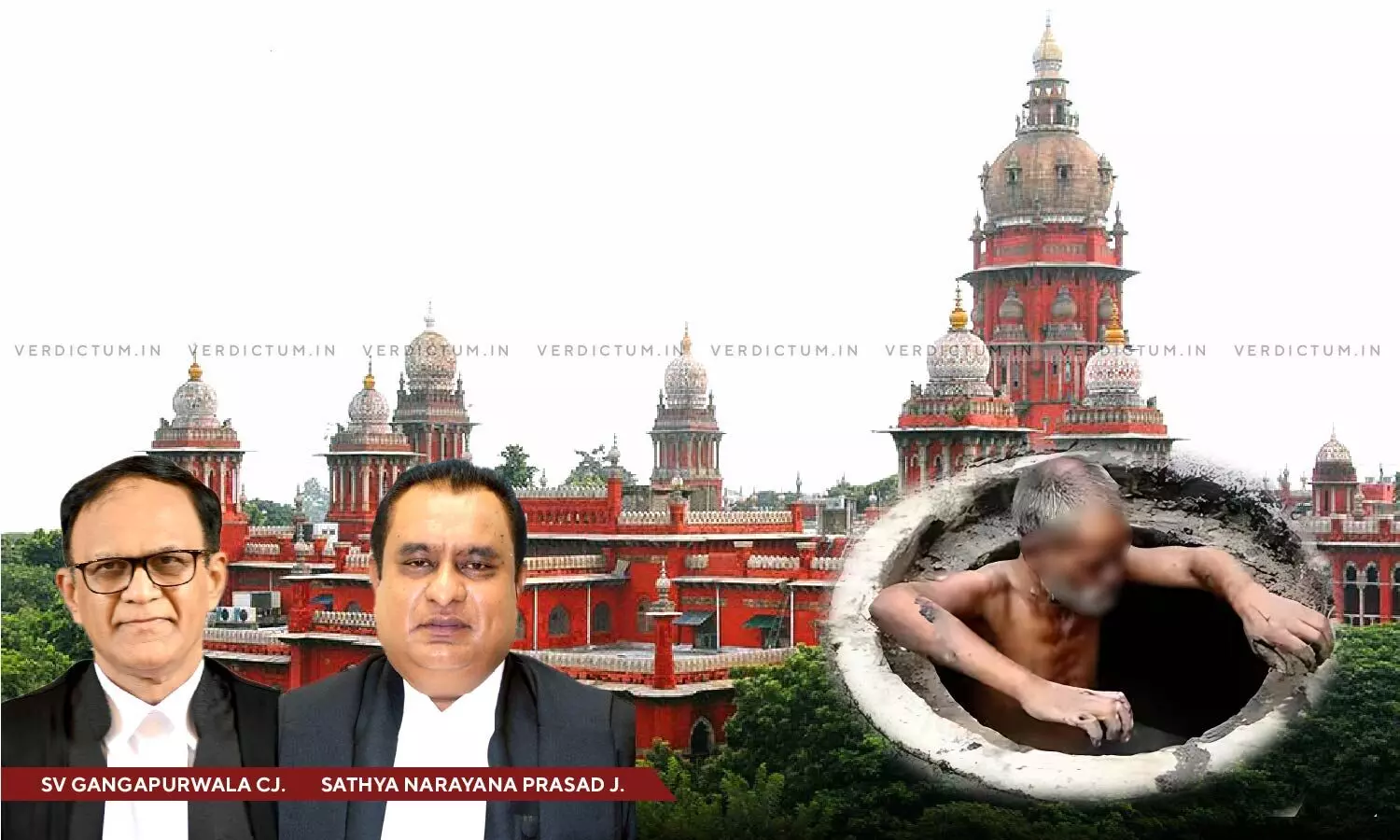
State-Sanctioned Casteism In Complete Contravention Of Constitutional Ethos: Madras HC Issues Comprehensive Guidelines To Eradicate Manual Scavenging
 |
|The Madras High Court has taken a decisive stance against the abhorrent practice of manual scavenging, issuing a comprehensive set of guidelines aimed at eradicating this dehumanizing practice and ensuring compliance with the Prohibition of Employment as Manual Scavengers and their Rehabilitation Act, 2013.
The Bench of Chief Justice SV Gangapurwala and Justice Sathya Narayana Prasad expressed profound concern over the persistence of manual scavenging in modern times, labeling it as nothing short of state-sanctioned casteism and a grave violation of constitutional principles.
The Court made the observations while hearing a plea filed by Safai Karamchari Andolan, seeking the eradication of manual scavenging in the state and the effective implementation of the Prohibition Act.
In its scathing remarks, the Court highlighted the obsolete nature of manual scavenging in an era marked by technological advancements, emphasizing that no individual should be subjected to such degrading and hazardous work, especially when viable alternatives exist.
"In the past there may have been a need for manual scavenging in the absence of technology. The situation as it stands in 2024 is different, not a single human being needs to be sent down a sewer. Doing so is nothing less than State sanctioned casteism in complete contravention of Constitutional ethos. Forcing a work upon a person as against his health, dignity and that of his family despite there being machinery available needs to be done away with. No bureaucratic red tape or claims of lack of funds can be an acceptable justification for not ensuring a life of health and dignity to the affected class of persons. This is nothing less than an extension of the notion of ritualistic purity and there needs to be a mind-shift change in the soul of the people. The buck starts and stops with the State," the Bench said.
It said that the Judiciary, as the custodian of fundamental rights, asserted that lack of funds could not serve as a justification for perpetuating this inhumane practice. The Court also underscored its obligation to safeguard the dignity and well-being of all citizens, irrespective of caste, gender, or socio-economic status, invoking Article 21 of the constitution to uphold the rights of marginalized communities.
"The Court being a protector and guarantor of fundamental rights, cannot be a mute spectator in such cases and allow a generational condemnation of an oppressed class to a life of poverty, ill-health, and indignity in complete disregard of their fundamental rights enshrined in Article 21 of the Constitution of India," it said.
The Court further said, "Apart from the physical health risks, manual scavenging also takes a toll on the mental health and well-being of those involved. The stigma and social ostracism associated with this work lead to feelings of shame, low self-esteem, and psychological distress among manual scavengers. The lack of alternative employment opportunities further perpetuates their socio-economic marginalization, trapping them in a vicious cycle of poverty and discrimination."
Addressing the multifaceted ramifications of manual scavenging, the Court condemned it as a blight on society, perpetuating systemic violence and indignity upon the oppressed. Furthermore, the Court recognized manual scavenging as a poignant reminder of the entrenched inequalities and discrimination that continue to afflict Indian society, entrenching marginalized groups in cycles of poverty and exclusion.
"The persistence of manual scavenging is a stark reminder of the deep-rooted inequalities and discrimination that continue to pervade our society, perpetuating the cycle of poverty, oppression, and exclusion faced by marginalized groups. We boast of the ground-breaking growth, but still there exists a community which makes its living by entering into septic tanks and manholes," the Court said.
To combat this entrenched injustice, the Court issued a slew of directions aimed at effecting tangible change:
1. Strict Enforcement: The Court mandated stringent action against individuals and entities involved in employing individuals for manual scavenging, emphasizing the imperative of upholding the rule of law and holding perpetrators accountable for their exploitative practices.
2. Safety Measures: Recognizing the grave health risks associated with manual scavenging, the Court directed the state to furnish protective equipment and safety gear to workers engaged in sanitary work, prioritizing their physical well-being and mitigating occupational hazards.
3. Mechanization: In a bid to modernize sanitation practices and eliminate manual intervention, the Court recommended the adoption of mechanized cleaning technologies, thereby obviating the need for human entry into hazardous environments.
4. Awareness and Sensitization: Acknowledging the pervasive stigma and marginalization faced by manual scavengers, the Court advocated for comprehensive sensitization programs aimed at educating both workers and the broader community about the perils of manual scavenging and the importance of dignity in labor.
5. Legal Compliance: Emphasizing the paramountcy of legal obligations, the Court enjoined the state to rigorously enforce the Prohibition Act, 2013, holding authorities accountable for ensuring its effective implementation and adherence.
6. Compensation and Rehabilitation: In recognition of the profound hardships endured by manual scavengers and their families, the Court called for enhanced compensation for injuries, disabilities, and fatalities resulting from scavenging work, as well as the formulation of schemes facilitating compassionate appointments for the dependents of deceased workers.
Moreover, the Court mandated free health check-ups for manual scavengers, underscoring the state's obligation to safeguard the well-being of those engaged in hazardous occupations. With an eye towards achieving meaningful progress, the Court set a deadline for the phased eradication of manual scavenging by 2026, signaling its unwavering commitment to justice and equity.
"The manual scavenging must be fully eradicated at least in a phased manner may be by the year 2026," the Bench said.
Accordingly, the Court scheduled the matter for further hearing on August 5.
Cause Title: Safai Karamchari Andolan v. Union of India and Others
Click here to read/download the Order